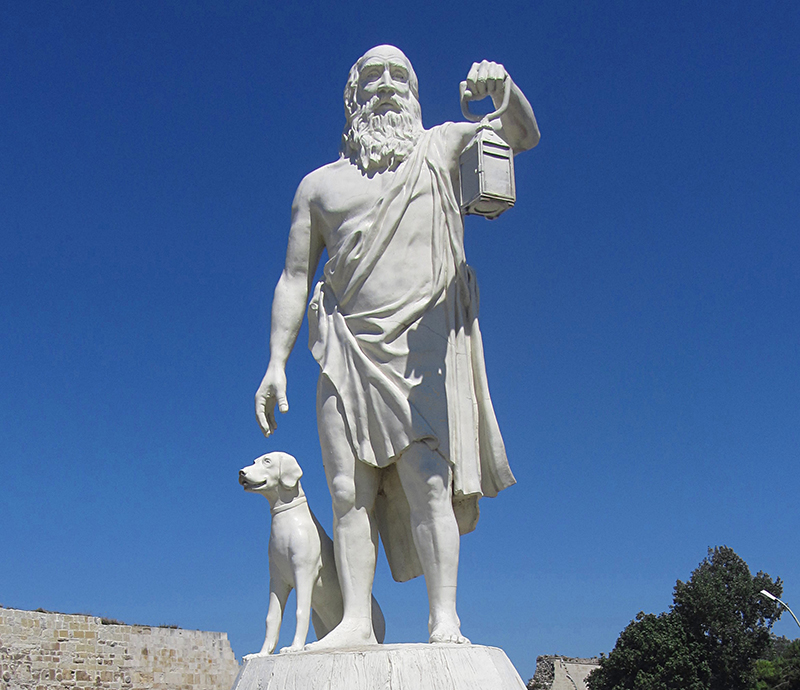Diogenes, the cynic philosopher that does not care about what think
More stories from Jake Sims
Diogenes, also known as Diogenes the Cynic, was a Greek philosopher and one of the founders of Cynic philosophy. He was born in Sinope, an Ionian colony on the Black Sea. He is credited with his massive contributions to the philosophy of cynicism; a Greek philosophical sect that stressed stoic self sufficiency and the rejection of luxury. He believed that personal happiness is satisfied by meeting one’s natural needs and that what is natural cannot be shameful His life, therefore, was lived with extreme simplicity and without shame. It was this determination to follow his own dictates and not adhere to the conventions of society that he was given the nickname of “dog,” from which the name “cynic” is derived. He lived so strictly to this maxim that when he saw a child drinking from his hands, so he threw away his cup and said, “A child has beaten me in plainness of living.”
For Diogenes the simple life meant not only disregard of luxury but also disregard of laws and customs of organized, and conventional communities. The family was viewed by Diogenes as an unnatural institution to be replaced by a natural state in which men and women would be promiscuous and children would be the common concern of all. Though Diogenes himself lived in poverty, slept in public buildings, and begged his food, he did not insist that all men should live in the same way but merely intended to show that happiness and independence were possible even under reduced circumstances. He was a firm believer in self sufficiency, or the knowledge that within oneself holds all the means to achieve happiness. He deeply resented the ideal that you had to conform to social expectation to achieve happiness.
He should this deep resentment for social conformity by urinating on those who insulted him, defecating in the theatre, and pointing at people with his middle finger. He was a self-appointed public scold whose mission was to demonstrate to the ancient Greeks that civilization is regressive.. He also lived in a tub on the side of the road. He would cuss those walking by and beg for his food. He had a simple diet of onions and water and lived up the ripe old age of 89. Legend says that he simply got tired of living and decided to hold his breath until he died. He gave instructions that when he died he wished his to be thrown outside the city wall on his death, so wild animals could feast on his body. The Corinthians erected to his memory a pillar on which rested a dog of Parian marble.
Diogenes was great at scorning his contemporaries. The school of Euclides he called bilious, and Plato’s lectures a waste of time, the performances at the Dionysia great peep-shows for fools, and the demagogues the mob’s lacqueys. He used to also say that when he saw physicians, philosophers and pilots at their work, he deemed man the most intelligent of all animals; but when again he saw interpreters of dreams and diviners and those who attended to them, or those who were puffed up with conceit of wealth, he thought no animal more silly. He would continually say that for the conduct of life we need right reason or a halter.
Despite his lude and rather inappropriate behavior the people of Athens loved Diogenes a great deal. They loved him so much that when a young child broke his tub, they whipped him and granted Diogenes with a brand new tub.
Aside from his ridiculous behavior Diogenes actually had some interesting and useful insights. Diogenes said that there was one only good, namely, knowledge; and one only evil, namely, ignorance. Being asked whether death was an evil thing, Diogenes replied, “How can it be evil, when in its presence we are not aware of it?” When someone declared that life is an evil, Diogenes said,
“Not life itself, but living ill.”
Diogenes was asked, Why do people give to beggars but not to philosophers?
“Because they think they may one day be lame or blind, but never expect that they will turn to philosophy,” Diogenes replied.
Being asked what creature’s bite is the worst, he said,
“Of those that are wild, a sycophant’s; of those that are tame, a flatterer”.
When asked from where he came, Diogenes said,
“I am a citizen of the world.”
To a young man who complained that he was ill suited to study philosophy, Diogenes said,
“Why then do you live, if you do not care to live well?”
When asked what was the proper time for supper, Diogenes replied,
“If you are a rich man, whenever you please; and if you are a poor man, whenever you can.”
A student asked to borrow a book, he replied:
“You are a silly man. If you wanted figs you wouldn’t be satisfied with painted ones. But you take no notice of the practice of virtue and study only those who write about it”.
Friends of Diogenes wanted to ransom him, where upon he called them simpletons;
“for”, said he, “lions are not the slaves of those who feed them, but rather those who feed them are at the mercy of the lions: for fear is the mark of the slave, whereas wild beasts make men afraid of them.”
When asked what was the right age for marriage, Diogenes replied:
“For a young man, not yet; for an old man, not at all.”
When asked how he would like to be buried, Diogenes replied ‘face downwards’, when asked why, he explained that the Macedonians were rising in power so rapidly that the world would shortly be turned upside down and he would then be the right way up.
Diogenes could very well be the most interesting philosopher the greeks had to offer. He lived had a refreshingly simple and honest lifestyle that no one today is likely to accomplish willingly. He taught us t that human life is fleeting and it doesn’t matter if you’re a great conqueror like Alexander or a cynical philosopher like Diogenes, one day you’ll be dead and gone. Another lesson we can learn is to live a simple and humble life, despite machinery that gives abundance we are left in want; through the teachings of Diogenes we can learn how to live happier life with less. We also must learn from Diogenes to have humor in our lifes despite his primitive conditions, Diogenes spent his life worry free with a good dose of humor. His outlook in life is considered to be one of the main reasons behind his long life. His disregard for what those around him can help us in reducing social fears. His indifference saved him a lot of time, worries, grief, and even jealousy. He wasn’t dependent on any personal possession or power, he wasn’t relying on anything for his happiness. Instead, he was happy with just the mere idea of being alive. Learning from Diogenes, we must also strip off our desire for material things if we really want to be happy. If we rely our satisfaction on the amount of money we have or how powerful we are, we’ll never feel content with what we have and or lifes. Most importantly we must learn to question authority. When the great conqueror Alexander the great stood before him, offering to him anything his heart could desire, all Diogenes had to say to him is that Alexander step out of his sunlight. All authority must be questioned, there should always be an opposition to authority. The presence of opposition ensures that nothing is passed as such without any friction. This keeps a check in the ruling authority.
We should attempt to implement these lessons to our lives in order to be more fulfilled and experience all the joy that existence has to offer us.

























